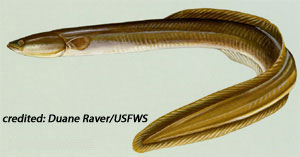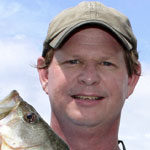
The North Carolina Wildlife Resources Commission is hoping to enlist the help of fishermen who catch American eels in the upper Roanoke River drainage for a study being done in partnership with Dominion Power.
As part of a national effort to restore the species, the Commission and Dominion Power are conducting a study to determine the effectiveness of two eel ladders that were built last year.
For the past 60 years, Roanoke Rapids Dam has blocked eels from swimming any farther upstream and kept them from completing their natural life cycle, which once included living from seven to 12 years in many rivers and lakes from Canada to Florida.
American eels serve as a source of food for many inland gamefish species, including striped bass and catfish. They are also caught by anglers who smoke them, use them for sushi or use them for bait. The installation of hydroelectric dams along the Roanoke and other coastal rivers changed all that. Bob Graham of Dominion Power said the eel ladders and others like them will once again allow safe passage for these eels.
The two eel ladders, which Graham calls “the biggest eelway passage in the Southeast,” resemble long sliding boards mounted with plastic pegs that allow eels to wiggle up and over, resting during their journey. At the top of these ladders is a fisheries biologist who tags the eels, measures them, and documents the data before releasing them into Roanoke Rapids Lake.
Chad Coley, a fisheries biologist with Dominion Power, said the public response has been overwhelmingly positive. The few exceptions, he said, were from folks who expressed concern that the eels would reproduce in the reservoirs and overpopulate the waters. But that’s not the case, said Coley. These eels only reproduce in the Sargasso Sea, then die within days. Their offspring flow with the tides, with some eventually reaching the South Atlantic coast.
Anglers who catch an eel from the Staunton, Roanoke, Hyco, and Dan rivers, or from Roanoke Rapids Lake, Kerr Reservoir, Lake Gaston, Leesville Reservoir or Smith Mountain Lake are asked to keep the eel, freeze it, and contact Graham at 804-271-5377 or bob.graham@dom.com. Graham will make arrangements to pick up the eel, which will then be studied to provide biologists a good look at how widespread the eels have become and the overall health of the species.




Be the first to comment